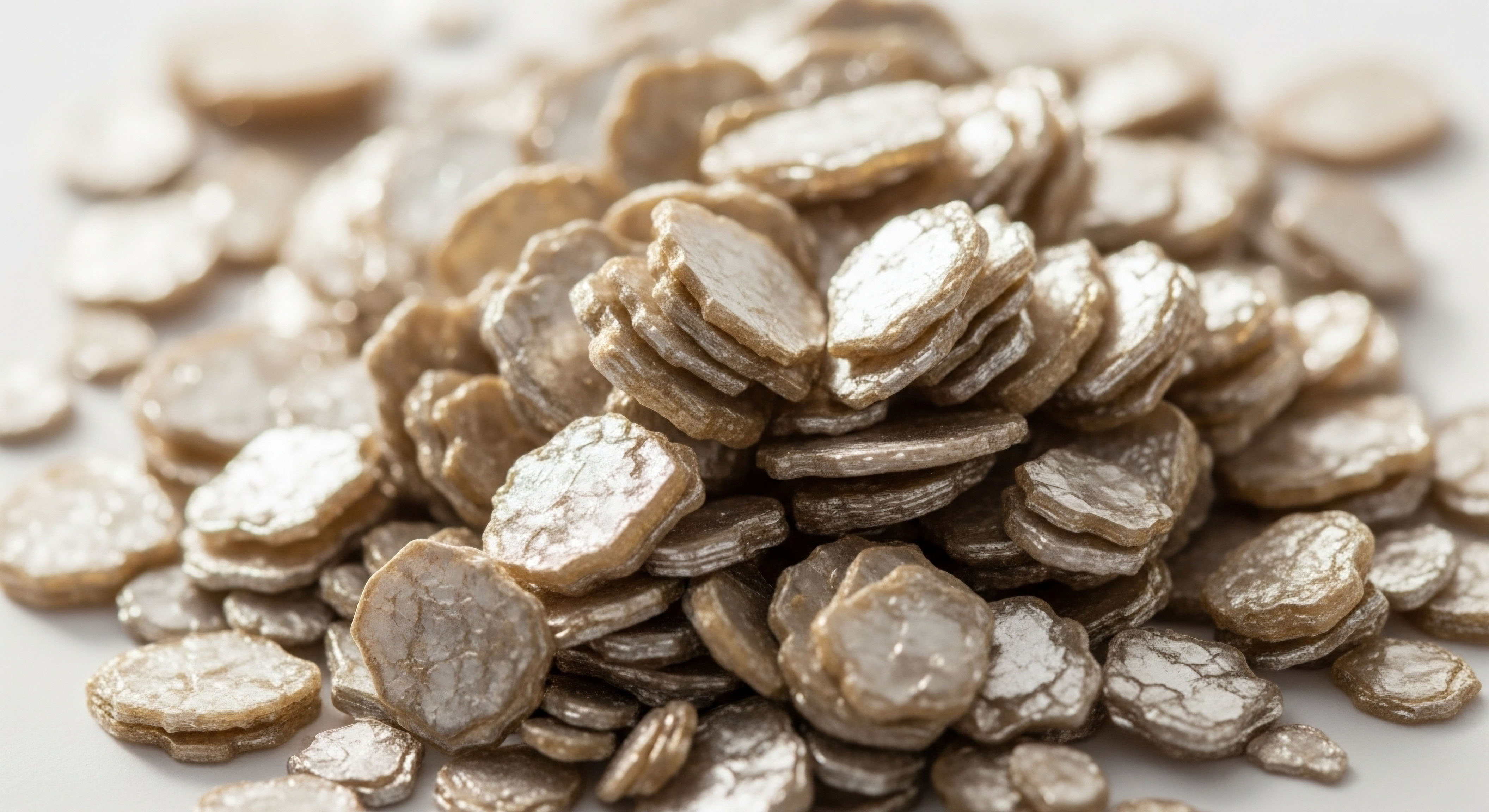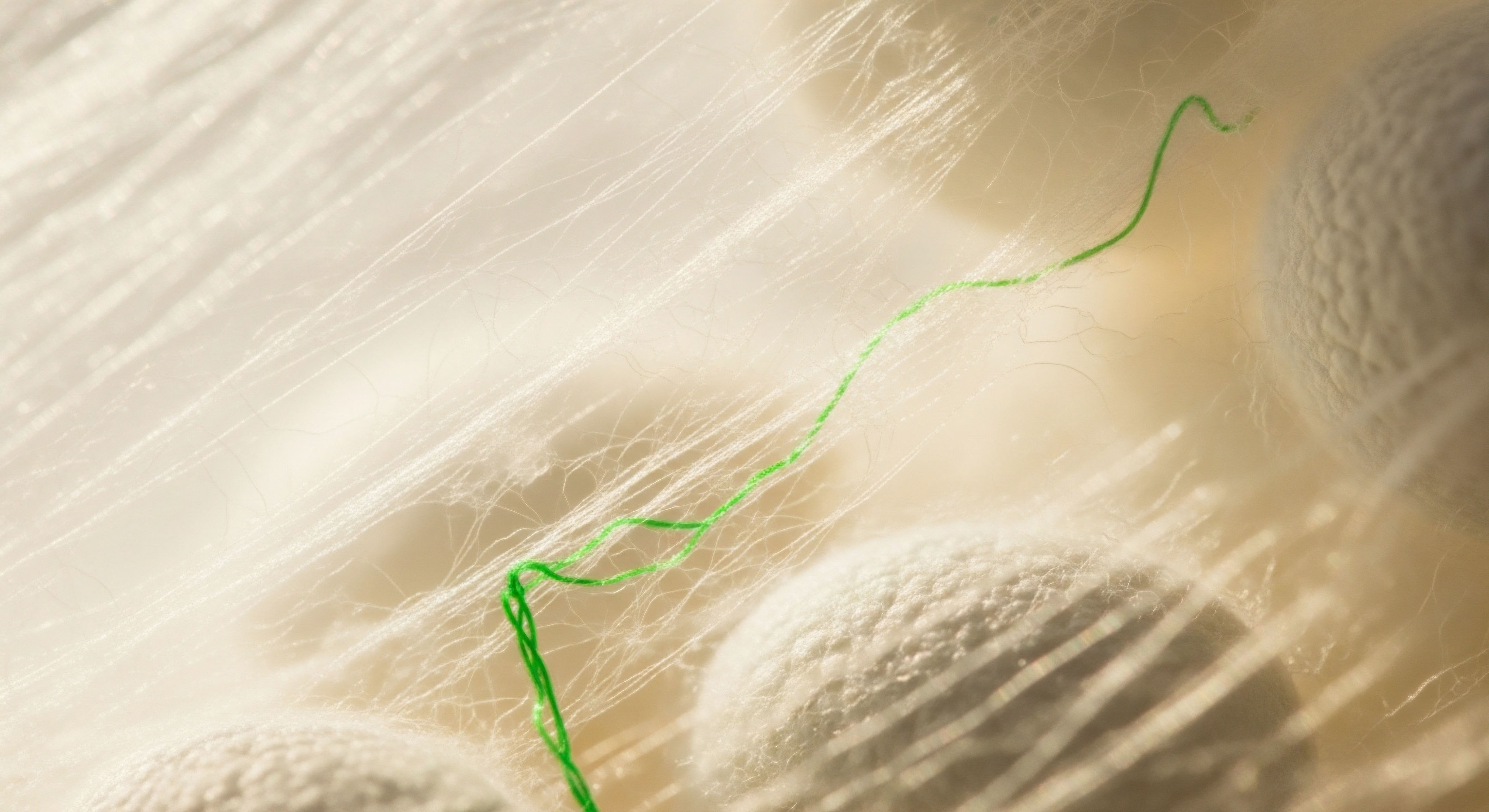

Fundamentals
Have you ever experienced a subtle shift in your daily energy, a quiet decline in vitality, or perhaps a change in your physical responses that leaves you wondering about your body’s inner workings? Many individuals encounter these moments, feeling a disconnect between their aspirations for robust health and their lived experience.
This journey toward understanding your own biological systems is not a solitary one; it is a shared human experience, and the path to reclaiming optimal function often begins with a deeper look at what we consume. Our dietary choices hold a profound influence over the intricate symphony of our internal chemistry, particularly concerning hormonal health and metabolic balance.
Testosterone, a steroid hormone, plays a central role in both male and female physiology, extending far beyond its well-known associations with muscle mass and libido. In men, it governs sperm development, bone density, and overall physical strength through enhanced protein synthesis. For women, appropriate levels contribute to mood stability, energy, and sexual well-being.
Erectile function, a complex physiological event, relies on a harmonious interplay of hormones, blood vessels, nerves, muscles, and brain signals. When any of these systems falter, the impact can be significant, affecting not only physical capability but also emotional well-being.
The connection between what we eat and these vital biological processes is more direct than many realize. Every bite of food provides instructions to our cells, influencing everything from hormone production to the health of our vascular system. Understanding these signals empowers us to make choices that support our body’s innate intelligence, guiding it toward balance and optimal performance.
Our daily food choices provide direct instructions to our biological systems, influencing hormonal balance and overall vitality.

The Body’s Internal Messaging System
Consider hormones as the body’s internal messaging service, carrying critical information between different organs and systems. Testosterone, for instance, is synthesized primarily in the testes in men and in smaller amounts by the ovaries and adrenal glands in women. This synthesis relies on a cascade of biochemical reactions, each requiring specific raw materials derived from our diet. When these essential building blocks are scarce, or when disruptive elements are present, the entire messaging system can become compromised.
Erectile function, similarly, depends on a delicate balance of signals. A key component is nitric oxide, a molecule that widens and relaxes blood vessels, allowing for increased blood flow necessary for an erection. The body’s ability to produce nitric oxide is directly influenced by dietary components.
If the vascular system, the network of blood vessels, is compromised by inflammation or plaque buildup, the delivery of these vital signals and blood flow can be impaired, leading to difficulties in achieving or maintaining an erection.

Foundational Dietary Elements
The foundational dietary elements that influence testosterone levels and erectile function span across macronutrients and micronutrients. Macronutrients ∞ fats, proteins, and carbohydrates ∞ provide the bulk of our energy and structural components. Micronutrients ∞ vitamins and minerals ∞ act as essential co-factors, facilitating the myriad enzymatic reactions necessary for hormone synthesis and cellular health.
For instance, dietary fat is not simply a source of calories; it is a critical precursor for steroid hormone production, including testosterone. Cholesterol, a component of dietary fat, serves as a primary building block for synthesizing this hormone. The type and quality of fats consumed can significantly alter this process.
Proteins provide the amino acids necessary for building and repairing tissues, including the enzymes involved in hormone regulation. Carbohydrates, particularly complex ones, can support testosterone production by modulating stress hormones like cortisol.
Beyond these larger categories, specific vitamins and minerals play indispensable roles. Vitamin D, often considered a steroid hormone itself, directly influences testosterone synthesis. Zinc is essential for testicular function and helps convert cholesterol into testosterone. Magnesium participates in over 300 bodily processes, including hormone regulation. These micronutrients act as vital cogs in the complex machinery of hormonal balance, and their deficiency can create significant disruptions.


Intermediate
Understanding the basic principles of how diet influences hormonal health sets the stage for a deeper exploration of specific dietary components and their precise mechanisms of action. Our bodies are remarkably adaptive, yet they operate within defined biochemical pathways. When these pathways are supported with optimal nutrition, the potential for robust hormonal function and sexual health becomes clear.

Macronutrient Dynamics and Hormonal Balance
The balance of macronutrients in your diet significantly impacts testosterone production and overall metabolic health.
- Dietary Fats ∞ The quality and quantity of fats consumed hold considerable sway over testosterone levels. Studies indicate that diets with a higher percentage of calories from fat, particularly those including some saturated and unsaturated fats, tend to maintain higher testosterone concentrations. A reduction in total fat intake, especially below 25% of total calories, has been associated with decreases in circulating testosterone. This is because cholesterol, derived from dietary fat, is the foundational molecule for testosterone synthesis. However, the type of fat matters. While some saturated fats are beneficial for testosterone production, excessive intake of trans fatty acids and certain omega-6 polyunsaturated fatty acids may negatively affect testosterone levels and testicular volume. Conversely, monounsaturated fatty acids (MUFAs) and omega-3 polyunsaturated fatty acids (PUFAs), such as EPA and DHA, are generally linked to improved hormonal profiles and cardiovascular health, which is critical for erectile function. Omega-3s assist in the efficient conversion of cholesterol into testosterone and activate Leydig cells, the primary sites of testosterone production in the testes. They also reduce inflammation, a known inhibitor of testosterone synthesis.
- Proteins ∞ Adequate protein intake is essential for overall physiological function, including hormone synthesis. Proteins provide the necessary amino acids for building and repairing tissues, as well as for the enzymes involved in the complex processes of hormone regulation. Research suggests that individuals consuming more protein tend to exhibit higher testosterone levels, often due to the association with animal-based foods that also provide beneficial fats and cholesterol.
- Carbohydrates and Sugar ∞ The type and amount of carbohydrates in the diet can profoundly influence hormonal equilibrium. Refined carbohydrates and excessive sugar intake are particularly problematic. High sugar consumption leads to rapid insulin release, which can cause an abrupt drop in total and free testosterone levels. Chronic high sugar intake contributes to insulin resistance and weight gain, both strongly linked to lower testosterone concentrations. These dietary patterns also fuel systemic inflammation, which negatively impacts the cells responsible for hormone production.

Micronutrient Support for Endocrine Systems
Beyond macronutrients, specific vitamins and minerals act as vital co-factors in the intricate biochemical pathways that govern hormonal health.
Vitamin D, often referred to as the “sunshine hormone,” directly influences testosterone production. Its receptors are present in Leydig cells, the primary sites of testosterone synthesis. Supplementation with vitamin D, particularly for individuals with a deficiency, has been shown to increase total, bioactive, and free testosterone levels. It also helps lower Sex Hormone-Binding Globulin (SHBG), thereby increasing the amount of biologically active, or “free,” testosterone available to tissues.
Zinc is another indispensable mineral for male hormonal health. It plays a direct role in Leydig cell function and testosterone synthesis. Zinc deficiency can lead to a significant drop in testosterone, while supplementation, especially in deficient individuals, can restore levels. Zinc also helps reduce the conversion of testosterone into estrogen, maintaining a more favorable hormonal balance. Foods rich in zinc include oysters, crab, and pumpkin seeds.
Magnesium, involved in over 300 enzymatic reactions, contributes significantly to hormone regulation. It can improve free testosterone levels and is crucial for overall metabolic health. Magnesium intake may also reduce the risk of blood vessel calcification in the penis, which is vital for maintaining healthy blood flow and erectile function.
Key micronutrients like Vitamin D, zinc, and magnesium are essential co-factors for robust testosterone synthesis and optimal hormonal signaling.
For erectile function, nutrients that support vascular health are paramount. L-arginine, an amino acid found in protein-rich foods like poultry, red meat, fish, and nuts, is a precursor to nitric oxide. Increased nitric oxide production leads to the widening of blood vessels, enhancing blood flow to the penis.
Similarly, nitrate-rich vegetables such as leafy greens (spinach, kale, arugula) provide substrates for nitric oxide, supporting endothelial function and blood flow. Flavonoids, found in berries, apples, and citrus fruits, also promote blood flow and have been associated with a lower incidence of erectile dysfunction.

Dietary Components and Their Hormonal Impact
The table below summarizes the influence of various dietary components on testosterone levels and erectile function, highlighting their primary mechanisms.
| Dietary Component | Influence on Testosterone | Influence on Erectile Function | Primary Mechanism |
|---|---|---|---|
| Healthy Fats (MUFA, Omega-3) | Increases, maintains | Improves, protects vascular health | Cholesterol conversion, Leydig cell activation, anti-inflammatory, nitric oxide production |
| Saturated Fats (moderate) | Maintains, may increase | Indirectly supports vascular health | Cholesterol precursor for testosterone synthesis |
| Refined Carbohydrates & Sugar | Decreases | Negatively impacts vascular health | Insulin resistance, inflammation, obesity |
| Protein | Maintains, supports | Supports overall health, nitric oxide precursors | Amino acid supply for hormone synthesis, L-arginine source |
| Vitamin D | Increases (if deficient) | Supports vascular health | Directly influences Leydig cells, lowers SHBG |
| Zinc | Increases (if deficient) | Reduces ED risk | Testicular function, testosterone synthesis, estrogen conversion |
| Magnesium | Improves free levels | Reduces vascular calcification | Hormone regulation, metabolic processes |
| Flavonoids | Neutral/Indirect | Improves, reduces ED risk | Antioxidant, blood flow enhancement |
| Phytoestrogens (Soy) | Generally neutral in healthy men | Potential benefits for sperm motility | Weak estrogen receptor interaction, varied research |

Clinical Protocols and Dietary Synergy
For individuals considering or undergoing hormonal optimization protocols, dietary choices become even more significant. For example, in Testosterone Replacement Therapy (TRT) for men, a standard protocol often involves weekly intramuscular injections of Testosterone Cypionate, sometimes combined with Gonadorelin to maintain natural testosterone production and Anastrozole to manage estrogen conversion.
While these medications directly address hormone levels, dietary support can optimize their effectiveness and mitigate potential side effects. A diet that minimizes inflammatory foods and supports metabolic health can enhance the body’s response to exogenous hormones and improve overall well-being.
Similarly, for women undergoing hormonal balance protocols, such as Testosterone Cypionate via subcutaneous injection or pellet therapy, alongside Progesterone, dietary considerations are vital. Nutrient-dense foods that support liver function for hormone metabolism and reduce systemic inflammation can aid in the body’s biochemical recalibration. The goal is always to create an internal environment that is receptive to therapeutic interventions and capable of sustaining long-term health.
Dietary strategies also play a role in supporting other targeted therapies, such as Growth Hormone Peptide Therapy (e.g. Sermorelin, Ipamorelin / CJC-1295) aimed at anti-aging, muscle gain, or fat loss. A diet rich in lean proteins and healthy fats provides the necessary building blocks for tissue repair and growth, complementing the actions of these peptides.
For specific concerns like sexual health, where peptides such as PT-141 might be used, a diet that supports vascular integrity and overall endocrine function can enhance outcomes.


Academic
To truly grasp the intricate relationship between dietary components, testosterone levels, and erectile function, we must delve into the sophisticated interplay of biological axes, metabolic pathways, and cellular signaling. This is not a simple cause-and-effect scenario; rather, it is a dynamic system where nutrition acts as a powerful modulator, influencing the very core of our endocrine and vascular health.

The Hypothalamic-Pituitary-Gonadal Axis and Dietary Regulation
The Hypothalamic-Pituitary-Gonadal (HPG) axis represents the central command system for reproductive and hormonal function. This tightly regulated feedback loop begins in the hypothalamus, which releases gonadotropin-releasing hormone (GnRH). GnRH then signals the pituitary gland to secrete luteinizing hormone (LH) and follicle-stimulating hormone (FSH). These gonadotropins travel to the gonads ∞ the testes in men ∞ to stimulate steroidogenesis, the process of producing sex hormones like testosterone.
Dietary factors can significantly influence the HPG axis at multiple points. Chronic exposure to a high-fat diet, or diets high in fructose and artificial sweeteners, has been shown to dysregulate the HPG axis, leading to decreased concentrations of FSH and testosterone.
This dysregulation can stem from metabolic disturbances, such as insulin resistance and chronic inflammation, which directly impair the signaling within this axis. For instance, obesity, often linked to poor dietary habits, increases serum levels of asprosin, an adipocyte factor that can injure the HPG axis and reduce testosterone levels. Interventions combining exercise and dietary changes have been shown to alleviate this dysfunction, restoring hormonal balance.
The HPG axis, the body’s central hormonal control system, is profoundly sensitive to dietary influences, with imbalances stemming from poor nutrition directly affecting testosterone production.
The precise mechanisms involve complex molecular pathways. For example, specific nutrients can influence the expression of genes involved in hormone synthesis and receptor activity. A diet that promotes metabolic health, such as a ketogenic diet, has been observed to restore normal regulation of the HPG axis and testosterone secretion in models of metabolic syndrome. This suggests that dietary patterns capable of improving insulin sensitivity and reducing systemic inflammation can directly support the integrity and function of the HPG axis.

Metabolic Pathways and Hormonal Synthesis
Testosterone synthesis is a multi-step enzymatic process that begins with cholesterol. This makes the availability and metabolism of dietary fats particularly relevant.
Saturated fatty acids and cholesterol, when consumed in appropriate amounts, provide the necessary raw materials for testosterone production. Studies have shown that reducing saturated fat in the diet can lead to a significant decline in circulating testosterone concentrations. This does not advocate for excessive consumption of unhealthy fats, but rather highlights the need for a balanced intake of diverse fat sources to support steroidogenesis.
Conversely, certain dietary patterns can disrupt these pathways. Diets high in trans fatty acids and some polyunsaturated fatty acids (specifically omega-6 arachidonic acid) have been inversely correlated with testosterone levels and testicular volume. These fats can contribute to cellular damage and inflammation, thereby impeding the delicate enzymatic processes required for hormone synthesis.
The role of the gut microbiome in androgen metabolism is also gaining significant attention. The gut microbiota has a bidirectional relationship with sex hormone homeostasis; it influences testosterone levels, and testosterone, in turn, controls gut microbiome diversity. Certain gut bacteria can affect the intestinal metabolism and de-glucuronidation of androgens, influencing the levels of free, active testosterone available in the body.
An unbalanced gut microbiome can lead to chronic inflammation, which interferes with testosterone production and elevates cortisol, further suppressing testosterone. A diverse and healthy gut microbiota, supported by fiber-rich foods and fermented products, can maintain intestinal homeostasis and support optimal hormone regulation.

Vascular Health and Erectile Function
Erectile function is fundamentally a vascular event, relying on robust blood flow to the penile tissues. Endothelial dysfunction, a condition where the inner lining of blood vessels (the endothelium) does not function properly, is a primary underlying defect in arteriogenic erectile dysfunction. Dietary choices profoundly influence endothelial health.
A plant-based diet, rich in whole foods such as fruits, vegetables, whole grains, nuts, seeds, and legumes, can significantly enhance penile erection by improving endothelial function. These foods provide nitrates, L-arginine, and L-citrulline, which are substrates for nitric oxide production. Nitric oxide is a potent vasodilator, relaxing the smooth muscles in the penile arteries and allowing for increased blood flow.
Moreover, a healthy diet can lower levels of low-density lipoprotein cholesterol (LDL-C), reduce trimethylamine N-oxide (TMAO), decrease postprandial triglycerides, and mitigate advanced glycation end products (AGEs) and inflammation. All these factors contribute to improved endothelial function, increased nitric oxide concentrations, and decreased arterial stiffness, thereby supporting erectile capability.
The impact of dietary inflammation on erectile function is particularly compelling. A diet high in pro-inflammatory foods ∞ including refined carbohydrates, sugar, and certain polyunsaturated fats ∞ is associated with an increased risk of erectile dysfunction. This pro-inflammatory state can lead to vascular endothelial injury by inhibiting endothelial nitric oxide synthase (eNOS) gene expression, which is crucial for nitric oxide production.
The dietary inflammatory index (DII) serves as a tool to quantify the inflammatory potential of a diet, and higher DII scores have been robustly linked to increased odds of erectile dysfunction.
Consider the profound implications of these connections. The very foods we choose can either nourish the delicate balance of our hormonal systems and support robust vascular health, or they can introduce disruptive signals that lead to dysfunction. This understanding moves beyond simplistic dietary rules, inviting a deeper appreciation for the biochemical dialogue occurring within our bodies.

References
- Kataoka, Tomoya, Yuji Hotta, and Kazunori Kimura. “A Review of foods and food supplements increasing testosterone levels.” Journal of Men’s Health 17, no. 2 (2021) ∞ 4-14.
- Fernández-Fígares Jiménez, Mariana del Carmen. “Plant-Based Diet and Erectile Dysfunction ∞ A Narrative Review.” The Journal of Nutrition (2025).
- Wrzosek, Michał, Dariusz Włodarek, and Jakub Woźniak. “The effect of zinc, magnesium and vitamin D on testosterone synthesis in men.” Polish Journal of Sports Medicine 34, no. 3 (2018) ∞ 123-134.
- Abdelsalam, Hani M. “Effect of Ketogenic Diet on the Hypothalamic-Pituitary-Gonadal Axis and Weight loss in Induced Metabolic Syndrome Rat model.” Bulletin of Faculty of Science, Zagazig University 2024, no. 1 (2024) ∞ 43-50.
- Qiu, Shi, Zhang Chichen, and colleagues. “Inflammatory diet linked to testosterone deficiency in men.” The Journal of Urology (2021).

Reflection
As we conclude this exploration, consider the profound agency you possess over your own health trajectory. The information shared here is not merely a collection of facts; it is a lens through which to view your personal biological landscape. Recognizing the intricate connections between your dietary choices, hormonal balance, and physical function is the initial step toward a more vibrant existence. Your body is a complex, self-regulating system, constantly striving for equilibrium.
The journey toward optimal wellness is deeply personal, requiring careful consideration of your unique physiology and lifestyle. This knowledge empowers you to engage in a more informed dialogue with healthcare professionals, guiding you toward personalized protocols that truly honor your individual needs.
The path to reclaiming vitality is not about quick fixes; it is about cultivating a sustained understanding and respect for your internal systems, allowing you to function without compromise. What small, intentional dietary shift might you consider today to begin recalibrating your own internal harmony?



